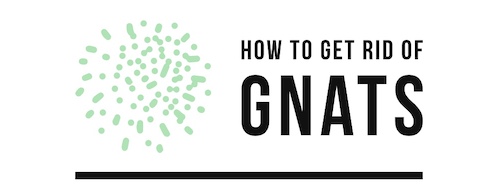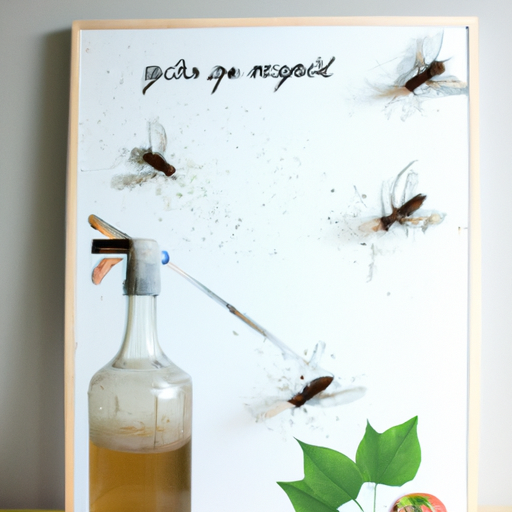What Causes Gnats to Infest Your Home?
Gnats are small, flying insects that can be a nuisance in the home. They are attracted to moist areas and feed on decaying organic matter. Gnats can infest your home for a variety of reasons, including:
1. Poor sanitation – Gnats thrive in damp, dirty environments where food and other organic matter is left out or not disposed of properly. This includes leaving dirty dishes in the sink, not cleaning up spills or crumbs quickly enough, and failing to take out the garbage regularly.
2. Open windows – If you leave your windows open during warm weather months without screens or other barriers to keep gnats out, they may enter your home looking for food and shelter.
3. Houseplants – Overwatering houseplants can create an ideal environment for gnat infestations as they provide moisture and decaying organic matter for them to feed on.
4. Outdoor sources – Gnats may also enter your home from outside sources such as compost piles or standing water near your property that attract them in large numbers
How to Get Rid of Gnats in Your House
Gnats are small, pesky insects that can be a nuisance in your home. They are attracted to moist areas and feed on decaying organic matter, such as fruits and vegetables. If you have gnats in your house, there are several steps you can take to get rid of them.
1. Identify the source of the gnats: Gnats often come from decaying organic matter or standing water sources such as sinks or drains. Check for any rotting food or standing water and dispose of it immediately.
2. Clean up: Thoroughly clean all surfaces in your home with a disinfectant cleaner to remove any remaining food particles that may be attracting the gnats. Pay special attention to areas where food is prepared or stored, such as countertops and cupboards, as well as bathrooms and other damp areas where gnats may breed.
3. Use traps: Traps can be used to capture adult gnats before they lay eggs in your home; these traps usually contain an attractant such as vinegar or fruit juice which lures the insects into a sticky surface where they become trapped and die off quickly without reproducing further infestations of gnats in your house .
4. Use insecticides: Insecticides containing pyrethrin can be used to kill adult gnat populations; however, these products should only be used if other methods have failed since they may also harm beneficial insects like bees and butterflies if not applied correctly .
5. Prevent future infestations: To prevent future infestations of gnats in your house , make sure all potential breeding sites are kept dry by fixing any leaking pipes or faucets promptly; store fruits and vegetables properly so they do not rot; keep garbage cans covered tightly; empty pet dishes regularly ;and use screens on windows and doors so that flying insects cannot enter .
Natural Ways to Repel Gnats from Your Home
Gnats are small, pesky insects that can be a nuisance in your home. Fortunately, there are several natural ways to repel them from your living space.
1. Keep surfaces clean and dry: Gnats thrive in moist environments, so it is important to keep all surfaces clean and dry. Wipe down counters and other surfaces regularly with a damp cloth or paper towel to remove any food residue or moisture that may attract gnats.
2. Use essential oils: Essential oils such as peppermint oil, lavender oil, eucalyptus oil, tea tree oil and citronella oil can be used as natural repellents for gnats. Add a few drops of the essential oil of your choice to a spray bottle filled with water and spray around the areas where you have seen gnats congregating in your home.
3. Use vinegar traps: Vinegar traps are an effective way to trap gnats without using harsh chemicals or pesticides. Fill a shallow bowl with apple cider vinegar and add several drops of dish soap into it; the soap will help break the surface tension of the liquid so that when the gnat lands on it they will sink into it and drown quickly. Place these bowls near windowsills or other areas where you have seen gnats gathering in your home for best results.
4 . Hang fly strips: Fly strips are an easy way to catch large numbers of flying insects like gnats at once without having to use any chemicals or pesticides around your home environment . Hang fly strips near windowsills or other areas where you have seen large numbers of flying insects gathering for best results .
5 . Plant insect-repelling plants : Certain plants such as marigolds , basil , lavender , mint , rosemary , catnip , lemongrass , garlic chives can help repel pests like flies and mosquitoes from entering your home environment naturally . Plant these herbs around windowsills or doorways for best results .
The Benefits of Using Insecticides for Controlling Gnat Populations
Insecticides are a common and effective method of controlling gnat populations. Gnats, also known as midges or no-see-ums, are small flying insects that can be a nuisance in both outdoor and indoor environments. They can cause skin irritation and spread diseases such as malaria, encephalitis, and West Nile virus. Insecticides provide an effective way to reduce the number of gnats in an area by killing them directly or disrupting their reproductive cycle.
Insecticides come in many forms including sprays, dusts, granules, baits, foggers/misters and aerosols. Each type has its own advantages depending on the situation. Sprays are often used outdoors to treat large areas quickly while dusts are better suited for treating cracks and crevices indoors where gnats may be hiding or breeding. Granules can be used outdoors to treat lawns while baits can be used indoors to attract gnats away from people or pets before they die from the insecticide’s effects. Foggers/misters create a fine mist that is able to reach into hard-to-reach places like attics or crawl spaces where other types of insecticides may not reach effectively. Aerosols provide quick knockdown of adult gnats but do not last long so they must be reapplied regularly for continued control over time.
Using insecticides for controlling gnat populations offers several benefits over other methods such as traps or repellents: it is fast acting; it does not require frequent reapplication; it is cost effective; it does not require physical contact with the pests; and it provides long lasting control when applied correctly according to label instructions. Additionally, some insecticides have additional benefits such as providing residual protection against future infestations by killing eggs before they hatch into adults which helps prevent future outbreaks from occurring in treated areas
How to Prevent Future Infestations of Gnats in Your Home
Gnats are small, pesky insects that can be difficult to get rid of once they have infested your home. To prevent future infestations of gnats in your home, there are several steps you can take.
First, it is important to identify the source of the gnat infestation. Gnats often enter homes through open windows and doors or through cracks in walls and foundations. If you notice any openings around your windows or doors, seal them with caulk or weatherstripping to prevent further entry. Additionally, inspect any plants that may have been brought into the house for signs of gnat larvae and discard any infected plants immediately.
Second, keep all food sources sealed tightly and dispose of garbage regularly to reduce the chances of attracting gnats into your home. Make sure all food containers are tightly sealed so that no odors escape which could attract gnats from outside. Additionally, empty garbage cans frequently and clean them with a disinfectant solution to eliminate any potential food sources for gnats inside your home.
Third, use natural repellents such as essential oils like peppermint oil or citronella oil around areas where you suspect an infestation may occur such as near windowsills or doorways as these oils will help repel the insects away from entering your home. You can also use sticky traps near areas where you suspect an infestation may occur; these traps will capture flying adult gnats before they enter your living space while also helping you identify if there is an active infestation in progress within your home environment.
Finally, contact a professional pest control service if necessary; they will be able to provide more effective treatments than what is available over-the-counter at local stores and can help ensure that all potential breeding sites are eliminated so that future infestations do not occur again in the future
Q&A
1. What causes gnats in my house?
Gnats are attracted to moist, damp areas and can enter your home through open windows or doors. They may also be drawn to decaying organic matter such as fruits, vegetables, and plants that have been left out in the open.
2. How do I get rid of gnats in my house?
The best way to get rid of gnats is to eliminate their food sources by keeping your kitchen clean and free of any rotting food or produce. You can also use a vacuum cleaner with a hose attachment to suck up any visible gnats from walls and ceilings. Additionally, you can use insecticides specifically designed for killing gnats around the perimeter of your home or inside if necessary.
3. Are there natural ways to get rid of gnats?
Yes! There are several natural methods for getting rid of pesky gnats in your home such as using essential oils like peppermint oil or tea tree oil which act as natural repellents; setting up yellow sticky traps near windowsills; using apple cider vinegar mixed with dish soap as an effective bait; and introducing beneficial nematodes into the soil around your home which will feed on the larvae that attract adult flies/gnats into your space.
4. Are there any health risks associated with having too many gnats in my house?
Yes, having too many flies/gnat infestations can lead to health risks such as allergies, asthma attacks, eye irritation, skin rashes, and even infections if they come into contact with open wounds on humans or animals living within the household environment. It is important to take steps towards eliminating these pests from entering your home before they become a problem!
5 .What should I do if I have an infestation?
If you find yourself dealing with an infestation it is important that you take immediate action by cleaning up all potential food sources (fruits/vegetables) that may be attracting them; sealing off entry points (windows/doors); setting up traps (sticky traps); using insecticides specifically designed for killing flies/gnat species; introducing beneficial nematodes into the soil around your property; and calling a professional exterminator if necessary!
Conclusion
In conclusion, there are many potential causes of why there are so many gnats in your house. These include the presence of food sources, such as fruits and vegetables, as well as standing water or damp areas that provide a breeding ground for gnats. Additionally, open windows and doors can allow gnats to enter your home from outside. Taking steps to eliminate these potential sources can help reduce the number of gnats in your house.

